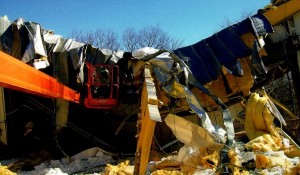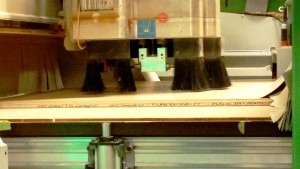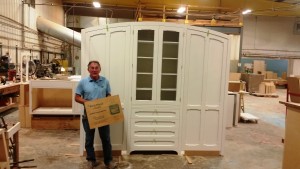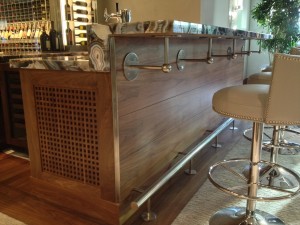Survive & Thrive the Fairfield County Millwork Way
- October 3, 2015
- •
- by Rich Christianson

Fairfield County Millwork battled back after its roof collapsed under the weight of heavy snow in 2011.
In February 2011 more than a dozen roofs collapsed under the weight of a heavy snow dumped by a nor-easter in and about Bethany, CT. Among those entities that sustained damaged roofs was Fairfield County Millwork, winner of three 2015 PureBond Quality Awards including best Commercial project.
John Ianiri, founder and president of Fairfield County Millwork vividly recalled that fateful day and how his team rallied to be back in production within 10 days after the calamity.
“We lost 11,000 square feet of manufacturing space in like 30 seconds,” Ianiri said. “Our people were working but fortunately all escaped without injury. But we did lose our moulder, our ripsaw our entire dust collection system, a sliding table saw, an edgebander, an up-cut saw and shapers. They were all destroyed.”

PureBond hardwood plywood is machined on a Biesse Rover G12 CNC machining center. Miraculously the machine was not damaged when the roof above it collapsed.
Miraculously, Iriani added the company’s then new Biesse Rover G12 CNC machining center was not damaged, even though it was in the area where the roof collapsed. “Someone was watching out for us,” he said.
To quickly get back in operation and fulfill customer orders, Iriani leased space at a building up the street from his plant. The Fairfield County Millwork team relocated the CNC machining center and other undamaged equipment into the temp space and was able to replace some of the destroyed equipment within a couple of weeks. Iriani also noted that about 10,000 square feet of the damaged plant was “workable.”
“We went from running a full-size moulder and ripsaw down to a basic table saw, jointer and planer operation, – but with a CNC machine – for a short period,”Iriani said. “During this time, we had some of our vendors run profiles and mouldings for us. We just kind of rearranged the way we did things.”
Fairfield County Millwork made due with its split makeshift operation while the plant was renovated. The project took more than five months to complete.
Today Fairfield County Millwork operates out of the rebuilt 22,000-square-foot facility in Bethany, CT, which includes about 2,000 square feet of office space. The company employs 24, people, 15 of which are directly involved with production. About 80% of its work is high-end residential with most of the remainder being commercial projects throughout Connecticut, plus Westchester County, NY, Nantucket Island and an occasional project in New York City. All of its project installations are subcontracted.
The Lady or the Tiger?
The debilitating roof collapse occurred just as the nation was beginning its slow recovery from the Great Recession.
“The 2009 to 2012 period was particularly frustrating to say the least,” Ianari said. “I tried to strive forward but it was tough. We were squashed like bugs by the economy. We are very fortunate to have a very competent staff of employees who are dedicated and helped us pull through difficult times. Many of them have 10 or more years with the company.”
So what’s worse, being squashed like a bug by the Great Recession or having your equipment squashed by a snow-laden collapsed roof?
No contest, “The economy,” Ianari said.
“These were two entirely different situations. The roof collapse was a devastating loss and could have put us out of business. Fortunately through a lot of hard work, great employees and a good insurance policy we were able to get some production up fairly quickly. There was a clear end in sight as to when the rebuild would be completed.
“The downturn, however, seemed to drag on forever with no way of knowing when it would turn,” Ianiri continued. “There were times when it was impossible to win bid awards that were above break even. That gets old and takes all of the fun out of the business.”
Ianiri added that lessons he learned from the economic recessions of 1991 and 2011 helped Fairfield County Millwork ride out a much more challenging economy. “Expanding our client base, keeping debt low and maintaining a reserve were the key factors to our survival. We were fortunate to have a ‘war chest’ with which to survive the downturn. Now it’s time to rebuild that chest.”
The Great Recession aside, Ianiri has enjoyed his long career in the woodworking industry. Prior to founding Fairfield County Millwork in 1982, he spent eight years with various companies involved in architectural woodwork, cabinetry and stair making.
About 10 years after launching Fairfield County Millwork, Ianiri joined the Architectural Woodwork Institute (AWI). He has served separate stints on the boards of directors of the national AWI and its New England Chapter, as well as several AWI committees. “I care about this industry and do what I can to help,” Ianiri said.
The company also participates in the AWI Quality Certification Program, “a quality assurance tool,” which Ianiri said he finds more important for commercial projects than for residential work. “We do find that simply by being a member of QCP that it lends a fair amount of credibility to our shop and if offers us opportunities to find projects and to have others find us. General contractors look at the AWI website to find local QCP firms,” Ianiri said.
Racking Up PureBond Quality Awards

John Ianiri, founder and president of Fairfield County Millwork, proudly displays the first-place plaque for best Commercial project in the 2015 PureBond Quality Awards competition.
After surviving the double whammy of an economic meltdown and roof collapse, Fairfield County Millwork is back on track and winning awards for its high-end woodwork. Over the last three years, Ianiri and his team have won seven PureBond Quality Awards in the annual competition sponsored by Columbia Forest Products. The three awards it won this year include first place in the Commercial category and second places in the Residential Bath and Residential “Other” categories.
Fairfield County Millwork’s top winning Commercial project was a for a private dining room and wine bar for an upscale New England restaurant. “This project involved a tremendous amount of custom woodwork. There is nothing standard about it,” Ianiri said.
Fairfield laid up walnut veneer on PureBond hardwood plywood panels for the casework. Radius layups were made using a Vacuum Pressing Systems bag press.
“The most challenging aspect of the winning project was coordinating various materials – glass, metal, stone, wood and a number of other items that were highly integrated,” Ianiri said. “The bar is backlit and we were responsible for integrating the lighting. The bar top has an integrated HVAC return grille. The project involved lots of moving parts. Finishing was done onsite by an artistic finisher. We worked very diligently with the architect and several subcontractors.”

Fairfield County Millwork’s first-place entry in the Commercial category of the 4th Annual PureBond® Quality Awards competition involved creating a private dining room and wine bar for an upscale New England restaurant.
A big part of winning the bid for the award winning restaurant project and many others requires using composite woods that contain no added urea formaldehyde (NAUF), Ianiri said. “We’ve been using PureBond panels regularly since they were introduced to the market. We’re seeing more and more projects that have well-written specs requesting NAUF products. I feel we’re well ahead of the curve in this regard.”
Fairfield County Millwork also is well ahead of where it was since the roof collapse incident.
“Our business is very strong right now and it seems poised for growth, providing the market conditions remain positive.” Ianiri said.
Learn more about Fairfield County Millwork at www.fcmillwork.com.




